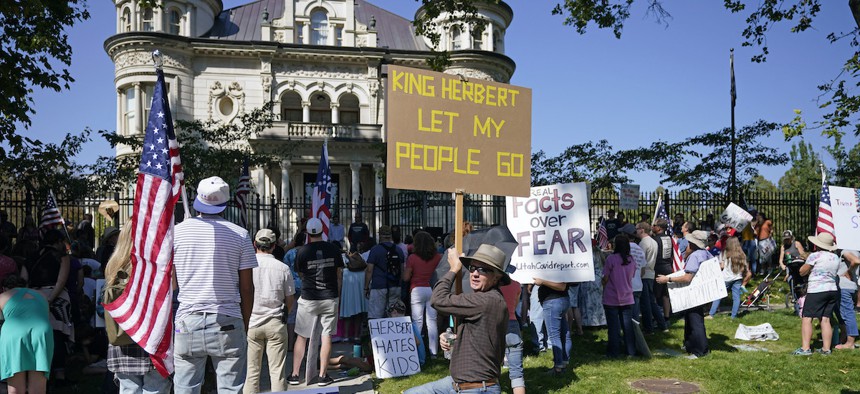One City Council Tried to Dissuade Protesters from Targeting the Governor's Private Home. (It Didn't Work.)

In this Sept. 12, 2020, file photo, people protest Gov. Gary Herbert during an anti-mask rally outside of the Governors Mansion in Salt Lake City. Protests have since spread to Herbert's private home in Orem, Utah. Associated Press
The city council in Orem, Utah, convened an emergency meeting to pass an ordinance restricting protests that target public officials' private homes. Two days later, protesters were back at Gov. Gary Herbert's house.
A city council in Utah convened a special meeting Friday to pass an ordinance prohibiting demonstrations that target public officials’ private homes after residents convened outside Gov. Gary Herbert’s house to protest a statewide mask ordinance.
The measure, approved unanimously by the Orem City Council, requires that protesters stay at least 100 feet from the property line of the person targeted by the protest. Violation of the ordinance is a class B misdemeanor, punishable by up to six months in jail and a fine of up to $1,000.
City Attorney Steve Earl said the rule is designed to balance protesters’ constitutional right to free speech with the right of “a person in their home to be free from that kind of intimidation and those kinds of threats.”
“It doesn’t take away, by any means, people’s right to demonstrate or protest,” he told the city council at its meeting Friday. “They just can’t focus it right by a particular target house.”
Protests began outside Herbert’s private home in Orem after the governor enacted a statewide mask ordinance in response to surging numbers of coronavirus cases throughout the state. Last month, anti-mask protesters also gathered outside the home of Angela Dunn, the state’s epidemiologist, after she recommended that residents wear masks and follow other public health guidelines to help control the spread of the virus.
“It’s scary,” she said. “It's taken a really big toll on my family and myself. I think it's really unfortunate that we live in a state where people feel that it is ok to harass civil servants.”
Ordinances that place restrictions on “targeted residential picketing” are relatively common in municipalities throughout the United States, including Washington, D.C. and Newport Beach, California. The U.S. Supreme Court previously upheld a similar ordinance in a Wisconsin town, ruling in 1988 that “one important aspect of residential privacy is protection of the unwilling listener. Although in many locations, we expect individuals simply to avoid speech they do not want to hear, the home is different.”
But the ordinances must be narrowly tailored to withstand scrutiny, the court added. “Only focused picketing taking place solely in front of a particular residence is prohibited,” the opinion reads.
Orem officials said they would not set up a physical barrier in front of Herbert’s home or indicate where the 100-foot line fell, and did not expect police to have to intervene in subsequent protests.
“Our goal here is not to necessarily enforce, but educate, and essentially maintain the peacefulness of the neighborhood while at the same time allowing individuals to exercise their First Amendment rights,” said City Manager Jamie Davidson.
It’s unclear how effective these ordinances are at deterring protesters. Salt Lake City has a similar policy, but protesters still targeted Dunn’s private home there. And two days after Orem passed its law, demonstrators gathered once more in front of Herbert’s home.
The group disbanded later and reappeared in a different county to protest in front of Gov.-elect Spencer Cox’s home. He greeted them with snacks.
“Never dreamed I would have protesters at my home in Fairview,” he tweeted alongside a picture of plates of plastic-wrapped cookies and a large orange thermos. “But we don’t get many visitors, so if you make the long drive, the least we can do is make you cookies and hot chocolate. I’m glad I got a chance to tell them I love them even if we disagree on masks.”
Kate Elizabeth Queram is a staff correspondent with Route Fifty and is based in Washington, D.C.
NEXT STORY: Patients Struggle to Find Prescription Opioids After New York Tax Drives Out Suppliers





